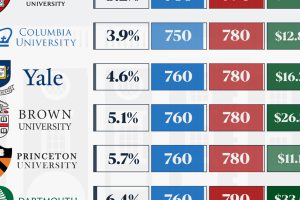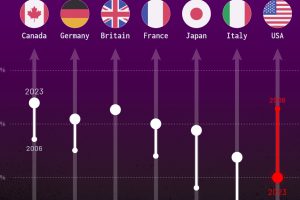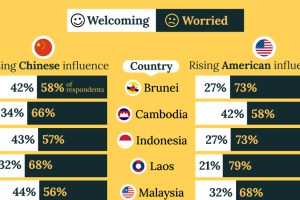Wealth Survey: How U.S. Students Feel About Their Finances
This was originally posted on our Voronoi app. Download the app for free on iOS or Android and discover incredible data-driven charts from a variety of trusted sources.
Student debt in the U.S. has ballooned to over $1.7 trillion, burdening millions of Americans with financial stress. Rising tuition costs and stagnating wages are considered to be the major drivers of this issue.
To gain insight into how this is affecting students, we’ve visualized the results of WalletHub’s Student Money Survey.
This survey was conducted in 2024 with a nationally representative sample of 210 students. Results were normalized by gender and income.
Data and Key Findings
Student wealth surveys can provide unique insights into the financial preparedness of younger Americans.
Starting with post-grad fears, it appears that the majority of students are afraid of either not finding a job, or paying off their debt.
| What is your biggest post-grad fear? |
% of respondents |
|---|---|
| 😔 Not finding a job | 39 |
| 💸 Student loan debt | 35 |
| 💳 Credit card debt | 13 |
| 🏠 Living with parents | 13 |
Some of these worries could subside in the future, as the federal government appears committed to cancelling federal student debt.
The latest news came on May 22, 2024, when the Education Department announced it would cancel $7.7 billion for borrowers who received Public Service Loan Forgiveness, which includes professions like teachers and nurses.
Regardless, 77% of students surveyed believed that their tuition was a good investment.
Not Learning Enough
Another highlight from this study was that nearly half (49%) of students feel that their school does not do enough to teach them about personal finance.
When survey respondents were asked to choose which topic they wished they had learned more about, the most common answer was “How to do my taxes”.
Learn More About the U.S. Education System from Visual Capitalist
If you enjoy posts like these, check out Mapped: Personal Finance Requirements by State, which visualizes where high school students are required to take a personal finance course.





